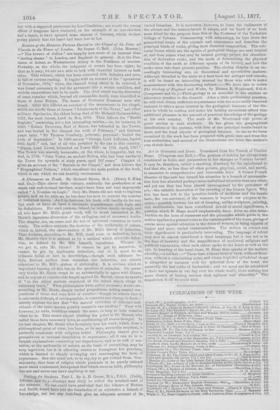A Discourse on Truth. By Richard Shute, M.A. (Henry S.
King and Co.)—This clever little volume, evidently the procluotion of an sante and well-trained intellect, might have been not very improperly called "A Treatise on Logic." Only Mr. Shute did not wish to frighten people, and as ho tells us, he has done his best to restrict the number of technical terms. As it is, however, his book will hardly do for any but SU& as have at least a moderate acquaintance with logic and its definitions. For such persons, indeed, ho writes clearly enough, and all who know Mr. Mill's great work will be much interested in Mr. Shute's ingenious discussion of the syllogism and of necessary truths. The chapter, too, on cause and the law of universal causation is worth study. The author contests the doctrine of the uniformity of nature, which is, indeed, the sheet-anchor of Mr. Mill's theory of induction. That doctrine, according to Mr. Mill, itself rests on induction, but in Mr. Shute's view it is arrived at by a method which scientific induc- tion, as defined by Mr. Mill himself, repudiates. Whence do we get it, asks Mr. Shute ? It cannot be got by sensation, it cannot be got by legitimate induction, and so it must be an ultimate belief or fact in knowledge,—though such ultimate be- liefs, derived neither from sensation nor induction, are utterly abhorrent to Mr. Mill's system of philosophy. It is obvious what an important bearing all this has on the question of miracles. On neces- sary truths Mr. Shute seems to us substantially to agree with flume, and he argues at considerable length against Dr. Mansel, whom he speaks of " as the ablest modern exponent of the school which clings to necessary truth." What philosophers have called necessary truths are, according to Mr. Shute, simply verbal propositions stating mental con- junctions of ideas, and oven laws of number—though he admits that it is extremely difficult, if not impossible, to conceive any change in them— merely express the fact that "the mental activities of different indi- viduals of the same species greatly resemble one another." They will, however, he adds, doubtless remain the same, as long as man remaino what he is. This seems almost yielding the point to Dr. Manuel, who called these laws necessary laws, as conditioning all human thought. In his last chapter, Mr. Shute tries to explain how his work, which, from a philosophical point of view, has been, as he says, avowedly sceptical, is perfectly consistent with religious belief. Philosophy cannot give a groundwork or rational foundation to experience ; all it can do is to furnish explanations connecting our experiences, and so to talk of sen- sation, or the uniformity of nature, as the basis of everything, may be very ingenious, but it is allowing reason to transgress her province, which is limited to simply atranging and rearranging the facts of experience. But she must not, so to say, try to get behind them. Con- sequently, that form of religion which pretends to be purely rational must stand condemned, but against tharwhich rests on faith, philosophy has not and never can have anything to say.






























 Previous page
Previous page